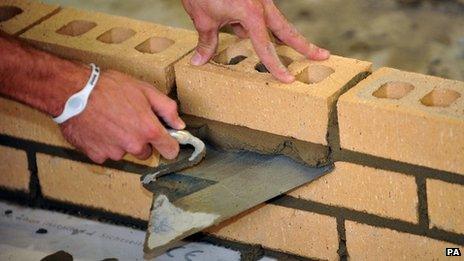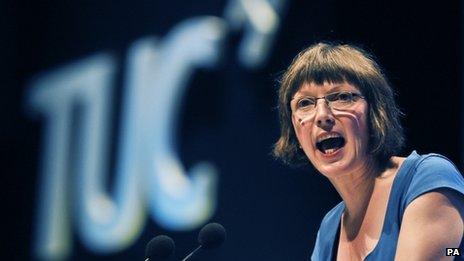Female apprentices train for low-paid jobs, TUC report says
- Published

The TUC wants to see more women in "male-dominated" workplaces
Female apprentices are more likely to end up in low-paid jobs as a result of training in "female-dominated sectors", new research has suggested.
A study by the TUC and the National Apprenticeship Service, external found roughly equal numbers of men and women became apprentices in 2011-12.
But the TUC said "gender stereotyping" was putting women off careers in traditionally male industries.
It found many women in hairdressing, but few in engineering or construction.
The report said more than 98% of apprentices in construction and vehicle repair were male, while more than 90% of childcare and hairdressing apprentices were female.
'Huge inequalities'
The TUC, which represents 54 trade unions, said the number of women taking apprenticeships had doubled over the last decade.
But it said female-dominated areas tended to offer lower wages and less chance of career progression.
The study also raised concerns about the low number of black and Asian people taking apprenticeships, especially in higher-paid sectors such as engineering and construction.
The proportion of apprentices from ethnic minorities rose from 6.6% in 2007-8 to 10.3% four years later, but these figures were 5.8% and 9.4% for higher and advanced level apprenticeships.
TUC general secretary Frances O'Grady said there was "genuine political will" to improve apprenticeships and people's access to them - but "huge inequalities" were still a problem.
"Young women still overwhelmingly find themselves pursuing careers in 'traditional' industries which tend to pay less, and black and Asian people continue to be under-represented in key sectors of the economy," she said.

Frances O'Grady said "huge inequalities" in apprenticeships must be tackled
"Unless we create better training and employment opportunities for young people, and challenge gender stereotyping and discrimination from the outset, the situation is not going to improve."
The report recommends promoting apprenticeships in schools in a way that challenges "traditional gender stereotyping from an early stage".
It also suggests research into the "barriers" facing black and Asian people, "more targeted support" for females and ethnic minorities, and more visits for young women to "male-dominated workplaces".
Stem support
Equalities minister Helen Grant said women were still "seriously under-represented" in science, technology, engineering and mathematics - known as Stem subjects.
"Women outperform men in so many ways and we need to fill them with the confidence that matches their potential," she said.
"Not only are women missing out on what can be a highly rewarding career, but UK companies are missing out on a huge pool of talent."
She said the government was "supporting a range of activities which aim to help promote Stem education and careers", including an ambassadors programme and a diversity programme.
- Published11 November 2013
- Published4 November 2013
- Published1 November 2013
- Published4 June 2013